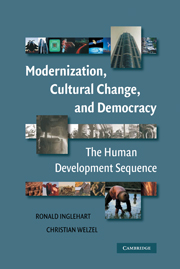Bibliography
Published online by Cambridge University Press: 05 September 2012
- Type
- Chapter
- Information
- Modernization, Cultural Change, and DemocracyThe Human Development Sequence, pp. 301 - 322Publisher: Cambridge University PressPrint publication year: 2005



